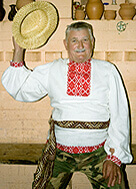Welcome to the museum complex of Dudutki dedicated to ancient folk crafts and technologies! Ahead you will have an exciting trip into the world of the age-old manners and occupations as well as the tasting of distinctive Belarusian dishes and horse-riding.
For more details see Services and Prices.
This village was first mentioned in chronicles in the 11th c. According to the texts of The Tale of Igor’s Campaign and the opinion of some researches, a legendary Polotsk prince Vseslav the Sorcerer wended his way to Polotsk using the road that supposedly passed through these places in the past…
The noble estate in Dudichi has been known since 1600. In 1621 it passed from Raphael Odakhovski to Yanush Bykhovets, the owner of numerous demesnes in Minsk, Grodno and Vilnya provinces. In the second quarter of the 17th c. Duduchi passed on the security to the family of Zaranki-Grobovskis and became the place of settlement of Bronislav and then of his sun Kazimir. In 1760 (according to some other sources, in 1748) Volkovysk magistrate Vladislav Bykhovets delegated the right to the perpetual use of Duduchi along with Kovalevichi, Sergeevichi and Kobylichi estates to Kazimir’s daughter Alexandra Zaranki-Grobovski that lived in Tolkachevichi together with her sister Elizabeth. In 1767, following his marriage to Alexandra, Dudichi passed as a dowry to Josef Prozor (1723-1788). In 1785 the estate was inherited by his daughter Rose, who married Stanislav Elski, the light horse colonel and financial commissioner of the Grand Duchy of Lithuania treasury. Afterwards the estate belonged to his sun Karol who graduated from Vilnya University, was the student of Andrew Snyadetski and became the Doctor of Medicine.
The information about the estate of those times can be found in the Inventory for 1844. At those days in in Dudichi there were 818 serfs and 9175 morgens of lands. The estate included two farmsteads (Kozlovichi and Belkevichi), the town of Dudichi, and Dudichi, Tereblya, Rasput, Belkevichi, Greben (where there was a mill), Kozlovy Borsk villages.
Dudichi belonged to Karol’s sun Michael (1831-1904), a famous violinist and composer. His and Maria Baranovich’s only daughter Sophia was married to Yanush Unikhovski, and according to the will of Michael, via the agnatic lineage the estate was inherited by his brother Alexander from Zamostie and after his death in 1916 by his son Yan, a lawyer from Minsk.
The development of the estate was encouraged by the privilege to hold tenders on Mondays and three fairs annually granted in 1766 by King Stanislaw Poniatowski. Dudichi became a famous craft and commercial hub. Regardless of the king’s privilege fairs took place monthly during the dark moon. There people could buy not only traditional bread and cattle but chiefly farm commodities and local handicrafts.
The estate in Dudichi keeps the memory of the life of its last owners – the family of Elskis. Stanislav Elski was famous for his love of music and his musical talent. He was distantly related and well acquainted with the renowned musician and hetman Michał Kazimierz Ogiński who owned the nearby estate of Ducora. The latter even dedicated his “G-dur polonaise for the violin and piano” to his “dear cousin Stanislav Elski and his wife Rose nee Prozor”. The ability for music was inherited by Stanislav’s son Karol who was taught by famous musicians Kieferling and Deschinski and turned Dudichi into “the estate of muses”. His son Michael was a prominent violinist.
World War I and World War II together with the 1917 October Revolution destroyed the Elskis’ heritage in Dudichi. Their offspring left the family estate and fled abroad (in Poland, Ukraine, Germany and France). In the 40s-80s of the 20th c. there could be found only the parkland with the remnants of the watermill and the system of the bypass channels. By the beginning of the 90s even old residents of the area had practically forgotten the history of these lands.
Their new owner – the head of “Polifact” publishing house Eugene Budinas was also unaware of the historically recent Dudichi’s fame. In 1992 Puchovichi district executive committee leased him out the territory of 162 ha in this area for the construction of a “farm”. The money earned by “Polifact” was used in order to make roads, build a high-tension power line, set a telephone communication, put up a pigsty and a cowshed, buy some livestock, farm machinery, and start business.
In October 1994 on the basis of this farm the museum complex of Dudutki dedicated to ancient folk crafts and technologies was created and had its first visitors. Since 1998 the museum complex has been a part of Trastbank holding. It is constantly renewed and developed and that gives us a chance to make popular not only Belarusian folk crafts but the way how people lived in such noble estates as well. Setting out for Dudutki, you should be ready for a historical trip… in modern times.

